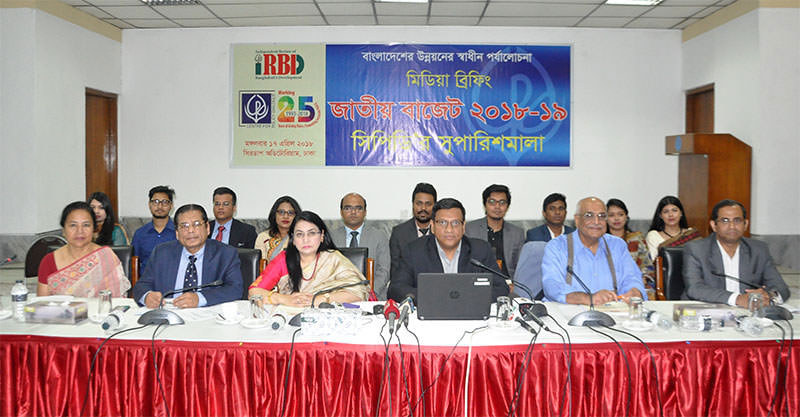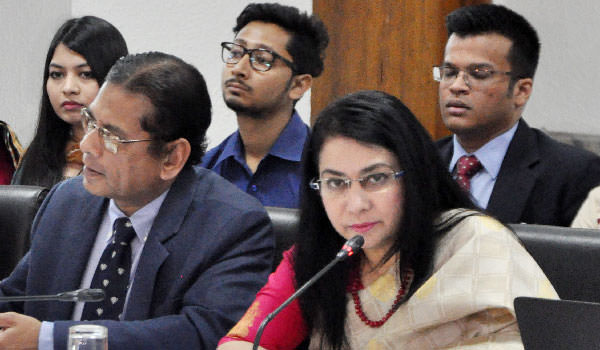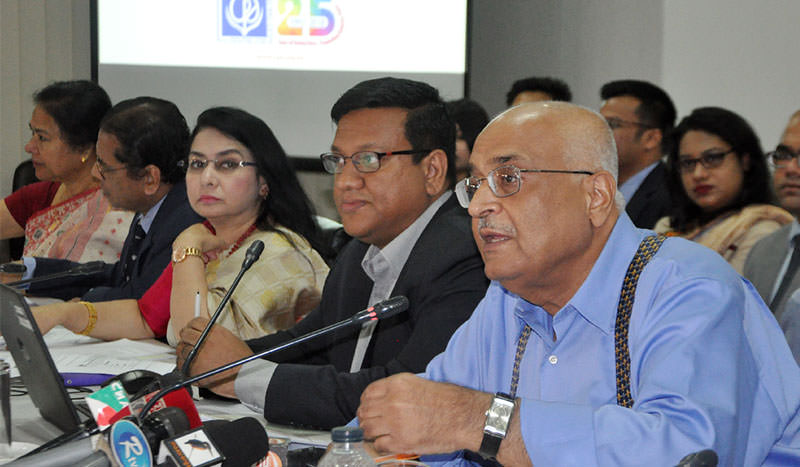
Declining real income despite increasing robust growth has become a dire concern. A nexus between growth, production, employment and income is seen lacking, leading to an unstable economy. In this economic scenario, while the national election is nearing, Government of Bangladesh requires making a budget balancing aspirational and pragmatic approaches. These were especially emphasised at the Centre for Policy Dialogue’s (CPD) media briefing on the release of the State of the Bangladesh Economy in FY2017-18 (Second Reading) and CPD’s Budget Recommendations for FY2018-19. The event was held at CIRDAP Auditorium, Dhaka on 17th April 2018.
 The briefing was moderated by Dr Fahmida Khatun, Executive Director, CPD and the report was presented by Mr Towfiqul Islam Khan, CPD Research Fellow. Following the presentation, Dr Debapriya Bhattacharya, Distinguished Fellow, CPD, Professor Mustafizur Rahman, Distinguished Fellow, CPD and Dr Khondaker Golam Moazzem, Research Director, CPD answered to various questions from the press.
The briefing was moderated by Dr Fahmida Khatun, Executive Director, CPD and the report was presented by Mr Towfiqul Islam Khan, CPD Research Fellow. Following the presentation, Dr Debapriya Bhattacharya, Distinguished Fellow, CPD, Professor Mustafizur Rahman, Distinguished Fellow, CPD and Dr Khondaker Golam Moazzem, Research Director, CPD answered to various questions from the press.
The presentation addressed the key concerns and challenges that emerged from the analysis. Recommendations for the National Budget FY2018-19 were given from these findings.
Key Concerns & Challenges
- Declining average monthly real income:
Real income has decreased. Income for women declined more compared the income of men. The income decline in the rural areas was also found to be higher than urban areas. The national average real monthly income declined to Tk. 13,258 for FY2016-17 compared to that of Tk. 13,602 for FY2015-16. The change in average real monthly income being at a decreasing 2.5%.
- Inverse relation of education and employment:
It is striking that people with higher education have lower scope for employment, as 34.3% of the labour force with tertiary education are unemployed.
- Banking sector malignancy:
The continuing banking sector crisis resulting to lower liquidity of money in the market is a pronounced phenomenon. With 21 banks investing beyond their exposure limit, the banking malignancy continues. The banking sector that has been undergoing a scam for years, has been “orphaned”, said Dr Bhattacharya
- Stagnant private investment:
The low liquidity of money discouraged private investment that eventually caused the high unemployment rate.
- Rohingya crisis:
The cost of carrying the burden of Rohingya crisis is an issue to address. The impact of the crisis on the fiscal implications is alarming.
- Import payments:
Adverse implications for the Balance of Payments (BoP), exchange rate stability and foreign exchange reserve led to the fast rising import payments.
Tk. 50,000 crore revenue deficit in the current fiscal year is predicted. The persisting growth not resulting to employment generation, private investment and income outturns were questioned to where the money is actually going. The economy of Bangladesh is turning from “jobless economy” to “low income employment”, stated Dr Bhattacharya.
Based on these concerns and challenges, the CPD offered the following set of recommendations.
Key Recommendations
- Identifying other sources of revenue collection:
CPD emphasises on Medium Term Revenue Strategy (MTRS) to improve the revenue-GDP and tax-GDP ratios. There is a need for identifying other sources of revenue generation. The tax-free income ceiling is suggested to be raised to Tk. 3 Lakhs from Tk. 2.5 Lakhs with the taxation rate reducing to 7.5% from the existing 10%. CPD recommends the due taxes from state-owned enterprises to be claimed through Alternative Dispute Resolution (ADR).
- Budgetary allocation for recapitalising state owned banks:
The allocation for banks should be monitored further for higher efficiency. The use of revenue to increase capital; private investors to buy bank shares and mergers with other banks were put forward as an alternative pathway.
- Import payments:
Government should discourage imports of consumer and luxurious commodities by raising L/C margins for import and reducing the time for L/C repayment. Foreign exchange stability should be aimed to persist.
- Social security, education and health:
Allocations for social security and separating the pension for government officials are recommended. Similarly, focusing more on the education and health sector is also important.
- SDG Trust Fund for NGOs:
The proposed SDG Trust Fund is necessary for the NGOs to be able to contribute in achieving the SDG goals as international funds reduces.
- Allocations for Rohingya crisis:
There is a need to chalk out a comprehensive plan for efficient resource mobilisation.
- ADP project implementation:
Timely implementation of big ADP projects should be prioritised. While, the Financial Division needs to ensure adequate budgetary allocations.
- Commissions to be built:
Establishment of Public Expenditure Review Commission, permanent Local Government (Finance) Commission, Agriculture Costs and Prices Commission, Independent Financial Sector Reform commission and Statistical Commission were highly advocated.
These were the key recommendations taken from the report published by CPD at the event.



